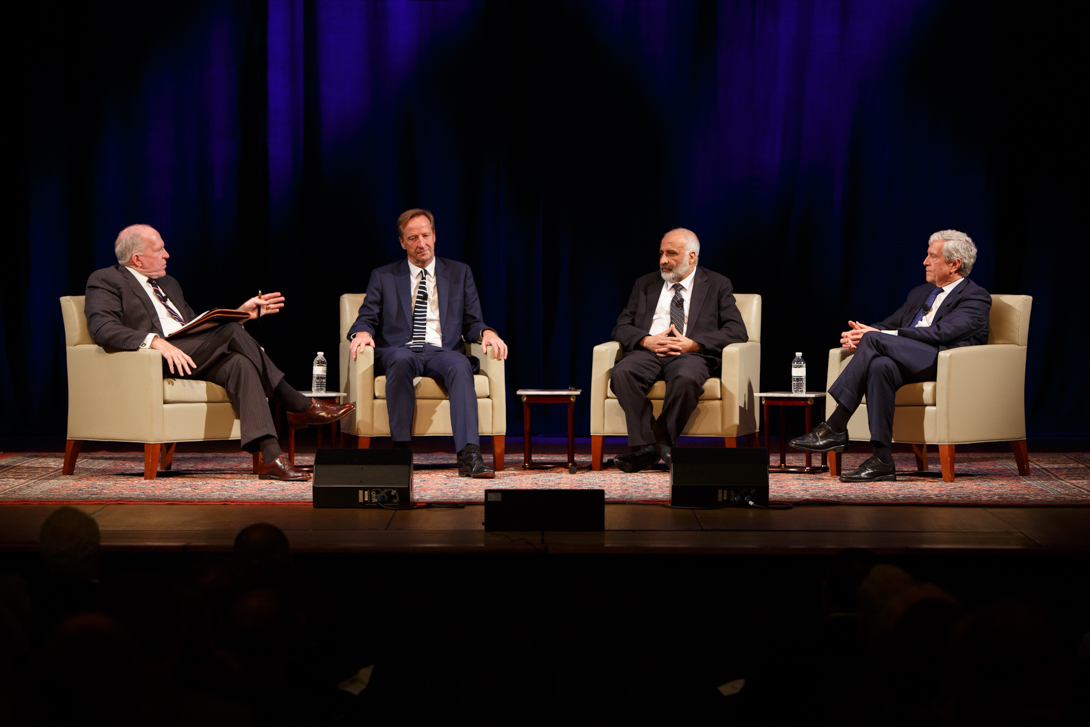By Kristen Mitchell
Central Intelligence Agency Director John Brennan told an audience at George Washington University the agency’s priorities have shifted over the past 40 years as technology has improved and global flash points have changed with more focus on non-state, terrorist actors.
"All the while strong nations such as China and Russia do not dampen their global ambitions,” Mr. Brennan said in a speech at GW’s Lisner Auditorium.
This shift in focus of the U.S. intelligence and national security agencies and other discussions on secrecy, technology and public trust were forefront at "The Ethos and the Profession of Intelligence,” a public forum co-hosted Tuesday by the CIA with the theme “Looking Over the Horizon.”
The forum brought together CIA officials and intelligence leaders from other global security organizations for panel discussions open to the public in Lisner Auditorium. Panels focused on global power rivalries among the United States, China and Russia, how technology has changed intelligence, assessing the potential toll of a humanitarian crisis and the importance of public trust and transparency.
Mr. Brennan said during his opening remarks that it is not feasible or reasonable for the intelligence community to return to a time when people were unaware that agencies like the NSA existed and the public didn’t know its role in national security.
“The American people have the right to know the types of activities that their federal government performs on their behalf. History has shown that blind trust is a false currency,” he said. “CIA and the rest of the intelligence community have to maintain the requisite level of public confidence in order to do our jobs effectively.”
The topic of public trust and intelligence secrecy is a complicated one, Mr. Brennan said, and there is a need for debate about the issues facing our world.
“The threats and adversaries we face are far too dangerous for the government to simply stand by and admire the problem,” he said. “We cannot return to the passive posture of years ago. We cannot cloak ourselves in secrecy and simply hope for the best. We have an obligation to earn the sacred trust the American people have placed in us.”
In the afternoon, Mr. Brennan moderated a panel with other intelligence chiefs including Director General of Afghan National Directorate of Security Mohammad Masoom Stanekzai, Director General of Australian Secret Intelligence Service Nick Warner and Chief of the British Secret Intelligence Service Alex Younger.
The panelists agreed that building relationships among agencies and sharing information has become more important in recent years. National security threats are no longer contained within a single region but can spread across the world through a transnational network made possible by digital communication.
“If we look at the number and complexity of the issues confronting our policymakers today all of them have at the heart a requirement for hard, timely intelligence,” Mr. Warner said. “Relationships with myriad intelligence organizations are important to us in ways they have never been before.”
The growing prevalence of non-state actors also has been a great concern for intelligence agencies.
National security has shifted over the last several decades away from powerful national rivals to groups like al-Qaida, the Taliban and most recently ISIS. The panelists were asked about the trajectory of terrorism and whether we have reached a global climax.
Mr. Younger said he tries to be optimistic, but there will be a persistent threat that can only be addressed by patient, long-term partnerships in the Mideast. He said it’s important to understand the economic and social issues rooted in terrorism to form a holistic picture of the problem.
Mr. Stanekzai said it’s important for Middle Eastern countries to generate a strong political will to contain and not support terrorist groups. Terrorist groups have become more extreme over time, he said, in order to recruit members.
“I think it is reaching the apex, but it is not ending at this stage,” Mr. Stanekzai said.
Mr. Warner said the ideologies of al-Qaida and ISIS have spread too widely to be eradicated anytime soon.
During a question-and-answer session the panelists were asked whether they agreed with the U.S. position on former NSA contractor Edward Snowden, who in 2013 leaked documents that detailed a mass surveillance program of Americans. Mr. Snowden was indicted under the Espionage Act and is unable to return to the United States without facing arrest. His actions have been condemned by U.S. security officials.
Mr. Stanekzai said processes that allow one individual to have access to the amount of secret information that was leaked should be reviewed. He called the leak an important lesson for the intelligence community. Mr. Younger said the damage the leak did to the public’s trust in technology and the intelligence community has been highly problematic.
Mr. Warner said there shouldn’t be a debate about whether performed a public service by leaking government documents.
“Edward Snowden damaged your national security in very significant ways,” he said.


